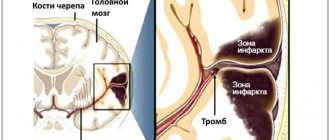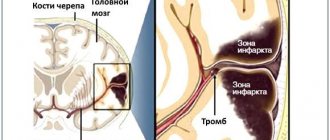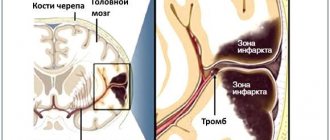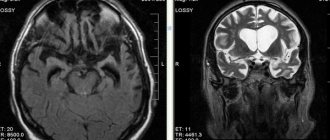Vegetative-vascular dystonia includes a whole complex of symptoms, and one of them is derealization. This condition is so unusual and specific that when it occurs, it can greatly frighten an already anxious neurotic. By the way, derealization does not occur so often. But once it’s “covered,” it can last a long time. Actually this is the most disgusting thing.
What is derealization in VSD, what are the symptoms of this disorder and how to get rid of this most unpleasant condition - we will analyze these questions in the article.
Derealization - what is it?
Derealization (dereal) is a special reaction of the nervous system, expressed in a feeling of the unreality of everything that is happening. The world suddenly ceases to seem real and is perceived as if from the outside. A person begins to feel like he is just dreaming and everything around him is not real. There may also be an effect of looking at the world as if through glass or fog. Perception is distorted, all colors and sounds may fade, the sense of time sometimes changes to a slower one.
Derealization is similar in sensation to the state that a person may experience when taking dissociative drugs. At the same time, the neurotic does not lose control of himself. He is fully aware of everything that is happening and is able to soberly assess his strange state, sensations, and perceptions. The person’s actions and behavior are also not disturbed; he remains adequate and sane. But the unfortunate man himself clearly suffers from a symptom of derealization and wants to get out of this frightening state as soon as possible. He begins to seek help, turns to doctors, shares what is happening with his loved ones, which indicates his complete mental normality.
Derealization usually occurs suddenly. It can be either a short-term state, into which a neurotic person falls periodically, or permanent. Often people cannot accurately determine and record the moment when they suddenly fall into dereal.
I feel disconnected from the world. What's happening?
Natasha, wait to be scared, let's try to figure it out.
Jamevue It is really rare. It can be a temporary phenomenon in mentally healthy people with severe mental stress or overwork. But doctors consider any recurring memory distortions to be one of the symptoms of some mental disorder.
Therefore, I recommend going to see a psychiatrist at the PND to determine whether there is a possibility of any psychiatric illness. If the doctor discovers a disorder, he will prescribe therapy, the process will stop, life will become easier and fears will decrease.
About her own, but she did a lot, just as for herself. All free money and time were given to home and mother. And not only mine, but also my sons and husband then. Before the New Year, my mother broke her leg. And the decision was made to take an apartment. My brother got the loan. The house is for sale.
By and large, we were simply presented with a fait accompli.
You had a home that you invested in and considered yours. And suddenly, all at once, you were presented with a fait accompli and the house was taken away. You asked your brother why the house was put up for sale without consulting you. Will he get the apartment too? Have you asked your mother any questions about the inheritance?
Bottom line. I'm completely out. I don't feel time. Muddy. I don't understand reality.
When there is a violation of the perception of reality, otherwise derealization, the world is perceived as unreal or distant, devoid of its colors and in which memory disturbances can occur - deja vu and jama vu.
Derealization is often associated with depression and is the main component symptom of anxiety neurosis or other mental disorders, also often together with depression or neurasthenia.
Describe your self-perception. Sense of self. Are there any changes in this? Disorder of self-perception of personality and alienation of its mental properties. Loss of sense of self. Do you notice the erasure of your personality traits? What emotions are you capable of now and how do you feel towards your loved ones?
Is the environment perceived dullly, as if through glass? Feeling like time is moving slowly or completely stopping?
Are thoughts in your head and memory as usual, or are there no thoughts and your memory is clearly reduced?
Absence of the very concept of “mood”
Difficulty in imagining, imaginative thinking
Dullness or absence of pain, tactile, temperature, taste, sensation of weight, feelings of sleep, hunger and satiety?
Derealization can “switch on” during prolonged chronic stress, fatigue, and the inability to regain one’s strength. Besides the situation with your home and your mother, is there anything else going on in your life that can be defined as prolonged stress and fatigue?
How are you recovering?
Symptoms of derealization in VSD
Each person perceives derealization differently and, accordingly, may experience different symptoms. Let's consider the most common effects in this pathological condition of the nervous system:
- The feeling of looking at the world around you, like a film, a dream, or through a distorting glass.
- A feeling of unreality of what is happening, as if it is not happening to you.
- Sounds, colors, smells, tastes, and the distance between objects can be distorted.
- It happens that the sufferer experiences a distorted flow of time; it seems to slow down. Sometimes, on the contrary, it goes too fast.
- Emotions are muted.
- Dizziness, unsteadiness of gait.
- Noise in ears.
- Headache.
- Weakness.
- Lack of air.
- Tachycardia.
- Drowsiness, lack of strength.
- Anxiety, depression, apathy.
- Difficulty concentrating and concentrating on anything.
- Fear of going crazy.
- In severe cases, there may be memory loss, loss of orientation in space, and “déjà vu” effects.
Derealization in neurosis and VSD is not a mental illness or psychosis. The victim does not experience hallucinations or other similar disturbances. A person understands well that his condition is abnormal, unlike a madman, who can rarely realize and admit it. Sometimes, a patient with vegetative-vascular dystonia and derealization even claims that he has gone crazy or defines his condition as borderline. However, as the experience of psychiatrists shows, truly crazy people are not aware of their condition.
Personal experienceThe world through a glass darkly: How I live with depersonalization
But I was lucky: I found groups on social networks about people with depersonalization-derealization syndrome. One day one of their members, with whom I had mutual friends, wrote to me and offered to help. He advised me to see a doctor who specialized in this disorder and helped him cope with it. There was one “but”: he could only consult via Skype, since he lived in Israel. It was unexpected and risky - but I was ready to take the risk.
We started communicating on Skype and the first thing we did was select a different treatment regimen: it contained a new medicine, a mood stabilizer, which no doctor had told me about in Russia before. Abroad, it is considered the gold standard for working with depersonalization-derealization. As a result, my treatment regimen looks like this: an antidepressant, an antipsychotic and a mood stabilizer, as well as mandatory cognitive behavioral psychotherapy. Now I take medication and save money for consultations - unfortunately, in Russia it is difficult to count on free psychotherapeutic help. Such depression is treated for at least two, and ideally three to four years.
The state of depersonalization-derealization changes a person: you see yourself differently (depersonalization) and the world around you (derealization). Typically, these two symptoms appear together. I practically don’t experience emotions - or rather, it seems to me that I don’t feel them, that they are “broken.” The psyche turns on a protective mode, in which all emotions are very weak, barely perceptible. Interest in life disappears: I really loved watching films, going to concerts, listening to music, but now I can’t perceive them as before. The hardest thing is to convey this to people - they simply do not believe that this is possible. It’s like there’s a cloudy glass in front of me that prevents me from seeing all the colors of life. It’s difficult to watch movies and read books because I don’t feel “involved” in what I’m doing, I can’t immerse myself in them. The text or picture is perceived as flat, gray, dull.
Depersonalization and derealization affect communication with people. If earlier I subtly felt the person I was talking to, now I feel practically nothing. I remember well how I perceived others before, what feelings communication with pleasant and interesting people evoked in me. By the way, longing for the past has also become inaccessible: I cannot reproduce previous sensations, although I remember them well. Memories, on the one hand, help me understand that one day I will be able to feel the world with the same strength. On the other hand, this is a dangerous trap: during depersonalization-derealization, it is not recommended to remember the past, so as not to aggravate the symptoms. Sometimes dreams are difficult to distinguish from reality: it seems as if everything that is happening to me now is not in reality. Over time, I decided to use this state - for example, I simply do not feel fear and calmly speak in front of the public, I am not shy in communicating with people.
Reasons for derealization
If dereal is not a mental disorder and does not threaten madness, what is it? After all, the condition is truly extremely pathological and frightening.
Science explains this syndrome as a special protective reaction of the nervous system to traumatic, stressful and other negative events in a person’s life.
Derealization occurs not only among neurosics and people with VSD. It can happen to any person who has suffered severe psychological trauma or has been in a depressed mood for a long time.
The nervous system, which has been in a very tense state for a long time, “decides” to alleviate this condition and turns on a special mode - derealization. The central nervous system, as it were, says to its carrier: “Hey, something happened in our lives, and you cannot yet realize it, accept it and find a way out. You are too tense and exhausted to relieve our condition. I will put you on a special regime, as if all this is not happening to us. And when you finally gain the strength to acknowledge the situation and decide to get out of it, I will return you to your normal state.”
Psychological reasons for the occurrence of derealization can be:
- Acute neurosis, VSD with panic attacks and increased anxiety.
- Chronic or severe stress.
- Traumatic events that have occurred.
- Excessive suspiciousness and sensitivity.
- Feelings of disappointment, dissatisfaction, collapse of plans or inability to achieve what you want.
- Chronic fatigue, lack of sleep.
- Depression.
- Being in an “unhealthy” environment, for example, in a quarrelsome team or in a family where scandals are frequent.
- Alcoholism, drug addiction.
Physiological reasons contributing to the development of derealization:
- Cervical osteochondrosis.
- Any disorders in the spine.
- Cerebrovascular disorders.
- Thyroid diseases.
- Hormonal disorders.
- Decreased vascular tone.
- Poor blood flow in the body.
- Muscle spasms.
Why does derealization often occur in neurosis and VSD?
Most often, it is VSD people who encounter the dereal symptom. Why is this happening?
This reaction of the nervous system develops approximately according to the following mechanism:
- A person suffering from neurosis begins to experience panic attacks and other unpleasant symptoms.
- A person begins to immerse himself, constantly listening to the sensations in the body.
- Any recorded “zilch” in well-being (for example, an increase in heart rate after eating or a spasm in the intestines) causes a new panic attack.
- The unfortunate person begins to be in a state of constant anticipation of troubles, health problems and new panic attacks, scanning his well-being every minute.
- The nervous system becomes hypertonic, muscles tense, and the whole body becomes stiff. A person cannot relax, it is difficult for him to be distracted, he practically ceases to experience positive emotions.
- The body cannot constantly remain in a state of such excessive tension, and since the neurotic person himself is not able to relax, the central nervous system turns on a defensive reaction, reducing emotions, distorting reality.
- A person becomes even more frightened by an unexpected and unusual state, and the vicious circle closes.
Is derealization dangerous?
As mentioned above, dereal is not a mental illness. With mild to moderate severity, the condition is not dangerous. But it significantly disrupts the quality of life of a neurotic and further aggravates an already deplorable condition.
Often, derealization occurs after panic attacks and does not last so long - from 15-20 minutes to 1-2 hours, then everything returns to normal.
In more complex cases, a person can remain in this state almost constantly. Some dangerous situations are already possible here: the unfortunate person may suddenly lose his bearings on the street, forget where he was going, his reactions and movements may be slow, which is unacceptable, for example, when crossing the street or driving.
With timely treatment, derealization is successfully stopped and does not have any negative effects on the psyche.
This syndrome is treated by a psychotherapist together with a neurologist.
How to get rid of derealization yourself
As the practice of specialists shows, derealization is poorly treated with pills and other medications. Although taking antidepressants, nootropics and sedatives is sometimes necessary in the first stages of therapy to relieve severe stress.
It should be understood that this is not a physiological disorder, but a mental reaction to stress. The first thing a person suffering from this syndrome needs to do is accept and understand the situation.
The more and more diligently the VSDeshnik isolates himself from what happened and thinks something like “why did this happen to me? This shouldn't have happened to me. Why do I need this? and everything in this vein, the more his psyche resists what is happening. This means that the tension increases.
You should accept everything as it is and try to find a way out. Do everything possible to correct the situation. Psychotherapists and neurologists claim that in the treatment of derealization and other symptoms of VSD, success depends 90% on the patient himself and his mood.
It is quite possible to bring your condition back to normal on your own. Don't expect very quick results. It may take more than one week, or even more than one month, to restore full balance. But it’s absolutely possible to adjust your nervous system on your own.
The main actions are aimed at relieving stress, relaxing, changing your attitude towards what is happening and the environment.
Methods on how to get rid of dereal on your own
- Rejection of bad habits.
- Normalization of sleep. If your sleep is disturbed, you may need to take a sleeping pill for the first time (prescribed by your doctor).
- Developing the most convenient daily routine for yourself. It is advisable to go to bed and get up at the same time.
- Walking outdoors, especially in the evening.
- Relax in a pleasant environment, good company.
- Doing pleasant things, hobbies, hobbies.
- Outturnings and relaxing meditations (have a very powerful restorative effect).
- Any physical activity (gymnastics, yoga, swimming, fitness).
- Reading interesting literature.
- Herbal teas with mint and valerian.
- Taking warm baths with salt, herbal infusions and essential oils before bed.
- Listening to soothing music.
- Taking vitamins that strengthen the nervous system (must be prescribed by a doctor).
- Formation of new, more positive views of reality.
Some people suffering from VSD begin to actively apply the above recommendations, but without seeing rapid improvements, they give up. This is a big mistake. It should be understood that neurosis and any mental trauma cannot be eliminated instantly.
It often happens that a person has accumulated stress within himself for many years, has experienced unpleasant events for a long time, and has formed a negative attitude towards something for years. And it will not be possible to eliminate this in a short time. You should immediately tune in to a slow but sure recovery. With regular exercise, derealization usually goes away quickly, but other symptoms of VSD can still be felt for a long time. There are also sharp improvements and “kickbacks”, after which many give up. But we can't retreat. A gradual change in attitudes, habits, and behaviors for the better will certainly lead to the restoration of health and psychological state.
If you find an error, please select a piece of text and press Ctrl+Enter. Thank you for your attentiveness and help!
Obsessive thoughts that everything that happens to me is unreal. Why is this happening?
Good afternoon, Irina.
Yes, rapid heartbeat and shortness of breath are also present
I feel like there's a fog in my head or I'm under a dome that I can't get out of. The world doesn’t seem as bright as before, everything is somehow blurry.
This condition occurs from a sudden release of adrenaline due to fear. And these are common symptoms of a panic attack.
But this condition can also occur for other reasons, so I will repeat my advice: be sure to undergo additional examination by an endocrinologist and neurologist. A malfunction in the endocrine or nervous system (brain) can also give rise to such symptoms. If, besides VSD, you are not given any other diagnosis, then your condition is of a psychogenic nature.
It scares me that it’s like I can’t live fully, my emotions are dulled, nothing makes me happy, it’s like a robot with one single thought: “what am I feeling now.” I feel like I'm going crazy
The fact that you seem to be lying in wait for yourself, anxiously waiting to see if what is happening is unrealistic, if everything is in order - this can create a tense background of constant fear, which pumps up hormones, causing a feeling of deafness and unreality. You find yourself in a vicious circle of your fear, which feeds itself.
I missed all my friends and relatives in my hometown, I talked to them every day. I remember feeling dizzy and out of breath. And I also remember telling my family that I felt like I was not me.
You are describing similar symptoms. Thus, we can assume that this is your typical way of reacting in a psychologically difficult situation. (There is a constitutional predisposition to this. But this is not a reason to worry about this: EVERY person has his own predisposition to some type of neurotic behavior in subjectively difficult circumstances (each of these circumstances is his own): someone is inclined to become depressed, someone develops obsessions, another develops psychosomatic symptoms, etc.)
What kind of difficulty you have and what it is connected with - this is what you need to find out.
When my parents leave, I am always sad, but still happy that they will have a rest.
Why are you sad, Irina? What are you sad about when your parents leave?
I remembered that during this period I had a nightmare. From time to time I often dream about them. But that nightmare did not let me go for a long time. In the dream, the parents quarreled very much and at some point it all got out of control and dad killed our cat. And the day before, I also dreamed of something terrible and bloody, but now I don’t remember what. In my opinion it all started just after, but I could be wrong.
You know, Irina, in connection with your story about how you missed friends and relatives as a child, and here you have a dramatic dream about quarreling parents, about your dad - I thought that a psychologically difficult situation for you could be something... something related to relationships with loved ones. And perhaps at the beginning of the summer you also experienced some anxiety about something that affects your relationships with loved ones. Think...
I didn't get enough sleep and felt exhausted.
Due to the fact that you did not get enough sleep, your internal composure could well have decreased: the nervous system, exhausted due to lack of sleep, reacted to the existing internal anxiety in the usual way. And the problem is not in this reaction itself, but in the reason for your anxiety - for what reason and why you are experiencing something difficult for yourself, what this difficulty consists of.
When I'm nervous or worried, everything intensifies. If in some situation I start to cry, then these are attacks again, so the advice of friends “you just need to cry” didn’t work right away.
What are you most often nervous, worried, worried about?
What in your life gives you the biggest, strongest, most significant reason to worry and be nervous?
What is the most difficult and/or scariest thing for you?
And when we were on vacation with a friend, there was only 1 attack the entire time, the rest of the 10 days everything was fine, and upon arriving home, nothing happened for some time either.
Can you remember how it came about? What were you thinking about then, what were you doing?
Everything weakens and disappears when I am distracted, in some positive moments, with family, with friends, when we go dancing. And when we were on vacation with a friend, there was only 1 attack the entire time, the rest of the 10 days everything was fine, and upon arriving home, nothing happened for some time either.
On vacation you find yourself in different circumstances, devoid of the things that cause you anxiety in normal life, so it is understandable to feel better. But what worries, what goes away when you go on vacation - can be an important question.











